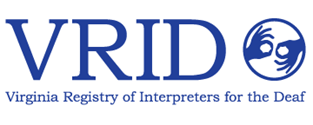
Mentorship Task Force
Mission: The Mentorship Task Force exists to evaluate existing interpreter mentorship programs, explore prospective methods, procedures and practices in mentorships, and present a potential solution(s) for a mentorship program within VRID to the VRID Board.
Philosophy: The Mentorship Task Force's philosophy is aligned with that of RID, in that we aspire for excellence in the delivery of interpretation services to ensure effective communication between Deaf, Hard of Hearing, and Hearing individuals. We believe that mentorship is an integral part of this pursuit of excellence and essential to the integrity of the profession of interpreting.
Vision: A profession with ample resources to seek out the opportunity to receive and/or provide mentoring, enhancing the overall quality of interpreting services in Virginia.
Philosophy: The Mentorship Task Force's philosophy is aligned with that of RID, in that we aspire for excellence in the delivery of interpretation services to ensure effective communication between Deaf, Hard of Hearing, and Hearing individuals. We believe that mentorship is an integral part of this pursuit of excellence and essential to the integrity of the profession of interpreting.
Vision: A profession with ample resources to seek out the opportunity to receive and/or provide mentoring, enhancing the overall quality of interpreting services in Virginia.
DISCLAIMER: The posting of resources to this page does not imply endorsement from VRID. It is simply a means to provide information regarding mentorship related offerings to our members. The utilization of any of the resources listed, be it people; programs or other; is at your own discretion.
|
|
Finding a Mentor:
To find a mentor, you should first know the skill areas you want to work on and what your goals are, e.g., improving processing skills, enhancing voice or sign interpreting skills, developing a deeper understanding of interpreting in legal or healthcare settings, etc. You should also take a little time to consider the characteristics of a mentor that would best suit your personality. Consider communication styles, and if you want a mentor that is more nurturing and more closely guides your progress, or do you want a mentor that gives you feedback, but allows you to take more of the lead in the work you do, or if there are other qualities that would be important to you in a mentor. Once you know more about what you want to do and what type of mentor you prefer, you can begin your search for a mentor.
A good place to begin your search would be at your place of employment or the IEP you graduated from to see if they have mentoring programs in place. Professional organizations, e.g., RID or CIT would also be good places to begin exploring mentor programs. If there are no programs in place, these would still be good places to look for individual mentors.
Direct personal contact is often the best way to find mentors. A good place to visit for a list of certified interpreters is the RID website. You can list the names of interpreters you know or respect because of the work they do, including their contact information. Then, you can start contacting the people who you would most like to be your mentor. You can explain your goals for the mentorship and see if they are able to work with you. If not, you can ask them for recommendations on people who might be able to meet your needs or someone that they may have worked with in the past as a mentor. (http://www.interpretereducation.org/aspiring-interpreter/mentorship/find-a-mentor/)
More Articles: https://www.streetleverage.com/tag/mentorship/
National Consortium of Interpreter Education Centers Mentoring Toolkit:
Other Resources:
- myASLmentor Online Mentoring Program: http://www.myaslmentor.com/MyASLMentor_Program_Schedule.html

